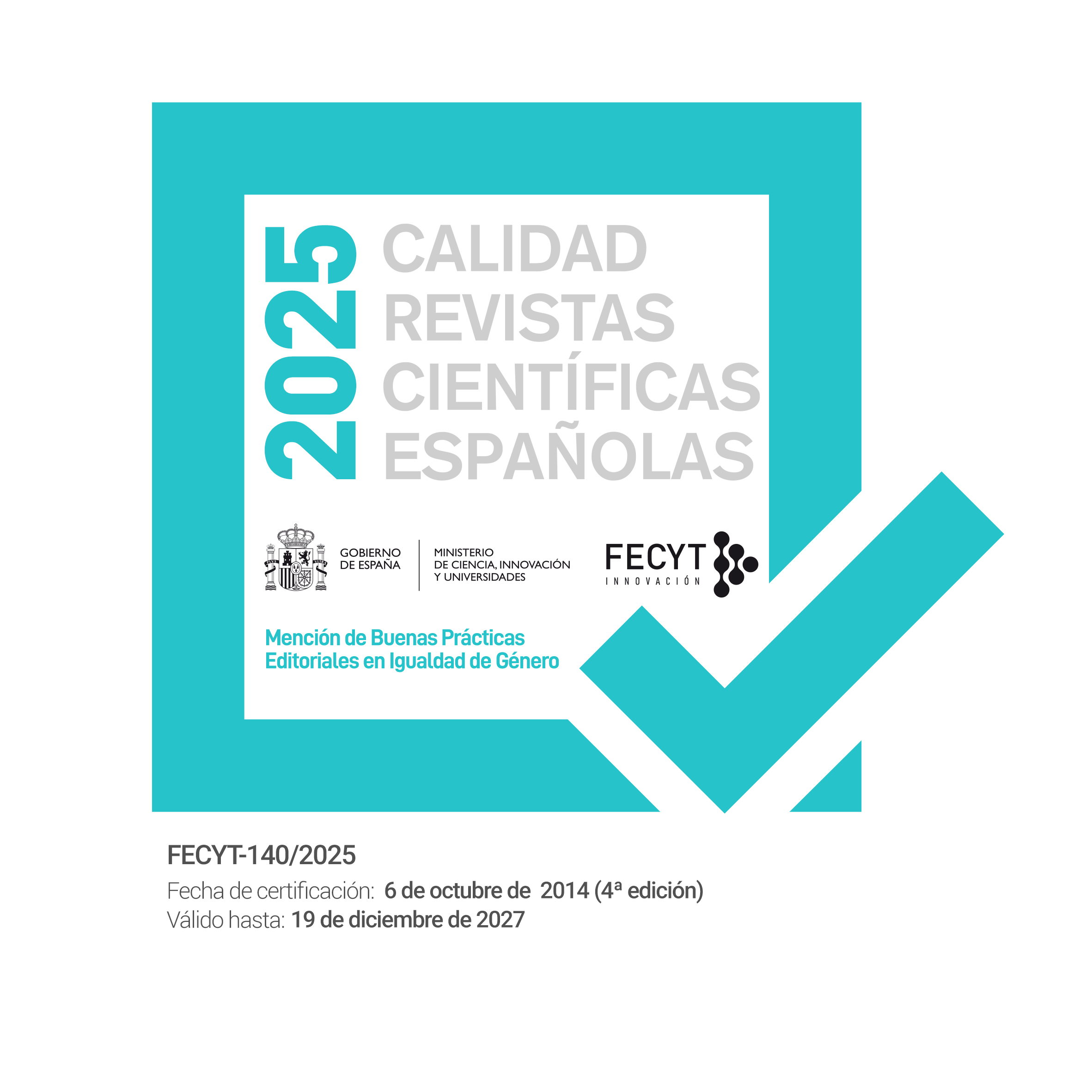INITIAL TEACHER TRAINING FOR SECONDARY EDUCATION IN SPAIN: PROFILE AND MOTIVATIONS OF THE FUTURE TEACHING STAFF
DOI:
https://doi.org/10.5944/educxx1.20007Keywords:
Secondary education, initial training, motivation for studies, teaching profile.Abstract
Initial teacher training is a key element for improving educational quality.The need to improve the skills and abilities of the new teaching staff, and
in particular, the motivations that lead the future teacher to choose the
masters degree in secondary school teachers are particularly relevant. The
importance of knowing these motivations lies in their potential as a predictor of future performance in teaching. In an incipient way, the literature highlights the need to study the motivational profile in the professional development of teachers. However, we consider that the attention given has been scarce so far. In this sense, the objective of this work is to delve further into the motivational analysis of the students of the teacher training masters. To that end, a survey of 512 students of various specialties was carried out in three Spanish universities (Burgos, Córdoba and Jaén), who answered a questionnaire about motivations and vocation for teaching. A factorial analysis was carried out in order to simplify and to learn their main motivations. In addition, a cluster analysis classifies the students according to their main motivation. The data reveals the existence of a negative relationship between both the intrinsic motivation for teaching and the age of the respondent. Moreover, it has also been found that the students of areas of knowledge related to Arts and Humanities show a higher level of intrinsic teacher motivation. On the other hand, the fact of having an earlier postgraduate degree is related to a lower vocation. Thus, understanding the motivations to be a teacher may be of interest to both the educational authorities in charge of the selection of students and those who have the power to plan teacher training from the point of view of curricular design.
Downloads
References
Aaronson, D., Barrow, L. & Sander, W. (2007). Teachers and student achievement in the Chicago public high schools. Journal of Labor Economics, 25(1), 95-135.
Azman, N. (2013). Choosing teaching as a career: Perspectives of male and female Malaysian student teachers in training. European Journal of Teacher Education, 36(1), 113-130.
Balan, C.C., Bujor, L. & Serdenciuc, N.L. (2012). The role of the initial psychopedagogical training in structuring motivational and attitudinal dynamic toward teaching career. Procedia-Social and Behavioral Sciences, 33, 463-467.
Bastick, T. (2000). Why teacher trainees choose the teaching profession: Comparing trainees in metropolitan and developing countries. International Review of Education, 46(3/4), 343-349.
Báusela, E. (2010). Planes de acción tutorial en la universidad. Revista de la educación superior, 39 (153), 119-122.
Biscarri, J. (1993). Motivaciones de los profesores respecto a su formación permanente. Revista interuniversitaria de formación del profesorado, 18, 221-237.
Biscarri, J., Filella, G. y Jové, G. (2006). Factores relacionados con la percepción de la calidad docente del profesorado universitario. Revista Interuniversitaria de Formación del Profesorado, 20(3), 287-309.
Bolívar, A. & Moreno, J.M. (2006). Between transaction and transformation: The role of school principals as education leaders in Spain. Journal of Educational Change, 7(1-2), 19-31.
Bolívar, A. (2007). La formación inicial del profesorado de secundaria y su identidad profesional. Estudios Sobre Educación, 12, 13-30.
Boyd, D.J., Grossman, P.L., Lankford, H., Loeb, S. & Wyckoff, J. (2009). Teacher preparation and student achievement. Educational Evaluation and Policy Analysis, 31(4), 416-440.
Brookhart, S.M. & Freeman, D.J. (1992). Characteristics of entering teacher candidates. Review of Educational Research, 62(1), 37-60.
Caballero, D. & Huertas, F.J. (2016). Main Motivations of Students of Childhood Education and Primary Education to Become Teachers. Mediterranean Journal of Social Sciences, 7(6), 153-158.
Cano, J., Orejudo, S. y Cortés, A. (2012). La formación inicial del profesorado de Secundaria: primera investigación en el desarrollo del prácticum de la Universidad de Zaragoza. Revista electrónica interuniversitaria de formación del profesorado, 15(3), 121-132.
Carabaña, J. y de la Fuente, G. (2016). Facultad por Facultad. Origen familiar y empleo de los licenciados en CCSS y Humanidades de la UCM en el año 2003. Revista Complutense de Educación, 27(3), 983-1001.
Cochran-Smith, M. (2009). The new teacher education in the United States: directions forward. Teachers and teaching, 14 (4), 271-282.
Comisión Europea (2013). Key Data on Teachers and School Leaders in Europe. 2013 Edition. Eurydice Report. Luxembourg: Publications Office of the European Union. Recuperado de https://goo.gl/21F7tK
Córdoba, F., Ortega, R. y Pontes, A. (2009). Los universitarios de ciencias ante la docencia en Secundaria como experiencia profesional. Revista de Educación, 348, 401-421.
Darling-Hammond, L. (2012). Powerful teacher education: Lessons from exemplary programs. San Francisco: John Wiley y Sons.
Donnelly, V. & Watkins, A. (2011). Teacher education for inclusion in Europe. Prospects, 41(3), 341-353. Esteve, J.M. (2006). La profesión docente en Europa: perfil, tendencias y problemática: La formación inicial. Revista de educación, 340, 19-40.
Fernández-Berrueco, R. y Sánchez-Tarazaga, L. (2014). Competencias docentes en Secundaria. Análisis de perfiles de profesorado. Relieve, 20(1), 1-20.
García-Garrido, J.L. (1999). El profesor del siglo XXI. Bordón. Revista de Orientación Pedagógica, 51(4), 435-447.
González-Bertolín, A. y Sanz-Ponce, R. (2014). De la relevancia de las reformas educativas en la evolución de la formación del profesorado de educación secundaria. Profesorado, Revista de Currículum y Formación del Profesorado, 18(1), 367-381.
Hair, J.F., Anderson, R.E., Tatham, R.L. y Black, W.C. (2004). Análisis Multivariante. Madrid: Pearson.
Hanushek, E.A. & Woessmann, L. (2010). The economics of international differences in educational achievement. CESifo (Working Paper, N.º 3037). Recuperado de: https://www.econstor.eu/.
Harris, D.N. & Sass, T.R. (2011). Teacher training, teacher quality and student achievement. Journal of public economics, 95(7-8), 798-812.
Hobson, A.J., Ashby, P., Malderez, A. & Tomlinson, P.D. (2009). Mentoring beginning teachers: What we know and what we don’t. Teaching and teacher education: An International Journal of Research and Studies, 25(1), 207-216.
König, J. & Rothland, M. (2012). Motivations for choosing teaching as a career: Effects on general pedagogical knowledge during initial teacher education. Asia-Pacific Journal of Teacher Education, 40(3), 289-315.
Kyriacou, C. & Coulthard, M. (2000). Undergraduates’ views of teaching as a career choice. Journal of Education for Teaching, 26(2), 117-126.
Larrosa, F. (2010). Vocación docente versus profesión docente en las organizaciones educativas. Revista electrónica interuniversitaria de formación del profesorado, 13(4), 43-51.
León, J., Domínguez, E., Núñez, J.L., Pérez, A. y Martín-Albo, J. (2011). Traducción y validación de la versión española de la Echelle de Satisfaction
des Besoins Psychologiques en el contexto educativo. Anales de psicología, 27(2), 405-411.
López-González, E., Pérez-Carbonell, A. y Ramos-Santana, G. (2011). Modelos complementarios al Análisis Factorial en la construcción de escalas ordinales: un ejemplo aplicado a la medida del Clima Social Aula. Revista de Educación, 354, 369-397.
Lorenzo-Vicente, J.A., Muñoz-Galiano, I.M. y Beas-Miranda, M. (2015). Modelos de formación inicial del profesorado de Educación Secundaria en España desde una perspectiva europea. Revista Complutense de Educación, 26(3), 741-757.
Mahler, D., Großschedl, J. & Harms, U. (2017). Using doubly latent multilevel analysis to elucidate relationships between science teachers’ professional knowledge and students’ performance. International Journal of Science Education, 39(2), 213-237.
Marcelo, C. (2009). Los comienzos en la docencia: un profesorado con buenos principios. Profesorado. Revista de currículum y formación de profesorado, 13(1), 1-25.
Marcelo, C. (2010). La identidad docente: constantes y desafíos. Revista Interamericana de Investigación, Educación y Pedagogía, RIIEP, 3(1), 15-42.
Martín-Vegas, R.A. (2015). La Didáctica de la Lengua y la Literatura Españolas en el Máster en Formación del Profesorado de Educación Secundaria. Revisión y renovación. Revista española de pedagogía, 73 (261), 365-379.
Ministerio de Educación, Cultura y Deporte. Gobierno de España (2014). TALIS: 2013. Estudio Internacional de la Enseñanza y el Aprendizaje. Informe Español. Recuperado de: http://www.mecd.gob.es/.
Molina, M.Á. y Esteve, R.P. (2016). El pensamiento del alumnado respecto de la formación inicial en el Máster de Educación Secundaria. XIV Jornadas de Redes de Investigación en Docencia Universitaria. Instituto de Ciencias de la Educación (ICE), Valencia.
Musset, P. (2010). Initial teacher education and continuing training policies in a comparative perspective. OECD Education Working Papers, 48, 1-50.
Neves de Jesus, S. y Lens, W. (2005). An Integrated Model for the Study of Teacher Motivation. Applied Psychology, 54(1), 119-134.
Organización para el Desarrollo Económico y la Cooperación. (2005). Teachers matters: Attracting, developing and retaining effective teachers. Recuperado de http://www.oecd.org/edu.
Özbek, R. (2007). Teacher candidates’ perceptions about importance of personal, economical and social factors which affect their decisions to be teachers. Fırat Üniversitesi Sosyal Bilimler Dergisi, 17(1), 145-160.
Perrenoud, P. (2001). La formación de los docentes en el siglo XXI. Revista de Tecnología educativa, 14(3), 503-523.
Pontes, A., Ariza, L. y Rey, R. (2010). Identidad profesional docente en aspirantes a profesorado de enseñanza secundaria. Psychology, Society & Education, 2(2), 49-60.
Pontes, A., Serrano, R. y Poyato, F.J. (2013). Concepciones y motivaciones sobre el desarrollo profesional docente en la formación inicial del profesorado de educación secundaria. Revista Eureka sobre Enseñanza y Divulgación de las Ciencias, 10, 533-551.
Puentes, R.V., Botia, A.B. & Verdejo, A.M. (2015). A review of the initial teachers’s education in Spain: The masters in secondary education. Educação em Revista, 31(3), 251-278.
Ryan, R.M. & Deci, E.L. (2000). Selfdetermination theory and the facilitation of intrinsic motivation, social development, and well-being. American psychologist, 55(1), 68-78.
Sahlberg, P. (2014). Facts, true facts and research in improving education systems. Inaugural Annual Lecture. British Educational Research Association (BERA).
Sarramona, J. (2007). Las competencias profesionales del profesorado de secundaria, Estudios sobre educación, 12, 31-40.
Serrano, R. y Pontes, A. (2017). Diferencias entre expectativas y logros en las competencias del Prácticum del Máster de Formación del Profesorado de Enseñanza Secundaria. Revista Electrónica Interuniversitaria de Formación del Profesorado, 20(1), 1-18.
Sinclair, C. (2008). Initial and changing student teacher motivation and commitment to teaching. Asia-Pacific Journal of Teacher Education, 36(2), 79-104.
Tribó, G. (2008). El nuevo perfil profesional de los profesores de Secundaria, Educación XX1, 11, 183-209.
Valcarcel, M. (2005). La preparación del profesorado universitario para la Convergencia Europea en Educación Superior. Educatio Siglo XXI, 23, 209-
Watt, H.M.G. & Richardson, P.W. (2008). Motivations, perceptions, and aspirations concerning teaching as a career for different types of beginning
teachers. Learning and Instruction, 18(5), 408-428.
Downloads
Published
How to Cite
Issue
Section
License
Copyright (c) 2018 Educación XX1

This work is licensed under a Creative Commons Attribution-NonCommercial 4.0 International License.
Educación XX1 is published under a Creative Commons Attribution-NonCommercial 4.0 (CC BY-NC 4.0)










